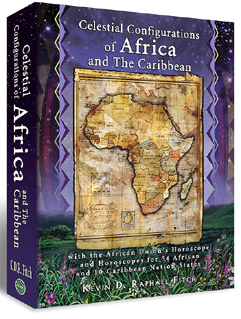Book
Review
Celestial
Configurations
of Africa and the Caribbean, by
Raphael Fitch, from Spirit
of Brotherhood Publications
Reviewed
by John Townley
Mundane
astrology is a difficult branch of the starry art
not because of any innate problems in analyzing the charts of nations
as
opposed to individuals, but for lack of easily-available and
authoritative
charts of the countries themselves. That’s understandably
difficult for older
nation-states like those in Europe or even America itself, as exact
times and
sometimes even the dates themselves that saw their precise beginnings
can be
unknown or in dispute in various historical records. In more modern
times, when
records and timekeeping are fuller and more exact, that
shouldn’t be so much of
a problem – and yet it is, usually because the simple records
for each small
nation aren’t always conveniently to be found in a readily
accessible place, in
a book or on the Net.
There
are a handful of good collections of national birth
data that have been around for a while, but until now nothing has
exhaustively
covered the many, young nation states of Africa and Africa-spawned
regions such
as the Caribbean. Finally, thanks to the tireless efforts of astrologer
and
researcher Kevin D. Raphael Fitch, that gap has been filled to
overflowing in
this 600+ page reference work. Over sixty independence charts are
included in
this fulsome work, organized by region, as well as charts of other
important
events that led to the historical formation and eventual independence
of
various states throughout .
And
since the average astrologer will not likely know too
much about how any one nation came to be, a history of each is
included, with a
brief cultural and developmental thumbnail (including photos) to better
understand the charts’ contexts. So, reading through this
book is actually a
broad historical tour of Africa itself, its history, and leaders.
It’s also an
introduction to how the author analyzes a mundane chart, what planets
and
houses represent what divisions of a nation, especially in the context
of the
rapid and often forced evolution of tribal societies into a modern
European
governmental and social model. Replete with personal tales and
illustrative
anecdotes, it’s a window into the author’s
astrological philosophy – or,
rather, where he feels astrology interfaces with culture and philosophy.
The
book boasts a surfeit of horoscopes, as each chart is
rendered in three forms: sidereal, tropical, and Vedic. The author
favors the siderealist
view, as that is the first option and also the option along which the
organizing
tables are structured, but the book is equally accessible to
tropicalists as
well. Actually, the charts themselves are available online as a free database
but that includes only the sidereal versions and without the
highly-valuable histories and background
that make this book so interesting and useful. The book is available in
electronic or hard-copy (soft cover) versions, and although digital is
cheaper and convenient, we happen to love
the weight and feel of the physical book itself, a worthy tome, a
weighty shelf-marker that earns its space among the best.
All
in all, this invaluable work is a ready-made classic
that fills a long-empty gap in the understanding of mundane astrology
and the
nations that individually and collectively make up the evolving halls
of
history. Much kudos to Mr. Fitch for this welcome culmination of years
of
devoted and faithful research, to be found nowhere else.
|





